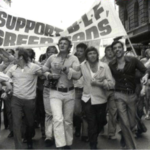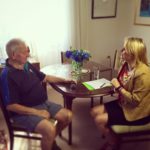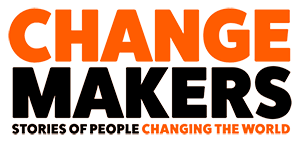Jack Mundey and how he made social change
by Amanda Tattersall

I remember when I first heard of Jack Mundey. It wasn’t at school, although it should have been, and it wasn’t from reading a sign on a big bold plaque in the Rocks or Centennial Park. It was from my friend at university.
At the time I was in the student movement, and my friend Zoe Taylor told me this extraordinary story that frankly sounded a little out of this world. It was a tale of a radical construction union that took up environmentalism, and even came up with an evocative phrase – the Green Ban. It then proceeded to protect, create and conserve Sydney for people and not just for capital. Her dad, Max Taylor, was also a unionist and friends with Mundey.
I was bemused. What was this man and this story, and why did no one know?
Around this time i fell in love with a guy called Charles, who, amongst his great fortunes was the nephew of ‘Aunty Merry’ – Meredith Burgmann – the keeper of the Green Ban archive, co-author of Green Bans Red Union (along with her sister Verity Burgmann) and close friend of Jack’s.
It was through Meredith that I first met Jack. I was 22. I was finishing my degree while also doing some casual tutoring at university. The subject was social change. On a mission to write the Green Bans back into our national history I had the idea that I would invite Jack Mundey to speak to my class. It was always going to be a ‘hail mary’ pass – I was a nobody casual tutor and while my students were lovely they were also a pretty random group of 18 year olds. It was hard to imagine that anyone of the stature of Mundey would make time for us.
Emboldened with the credential of being connected in some way to Meredith I put in my call. Judy, Jack’s wife answered and after a polite exchange put me straight on to Jack. Jack didn’t hesitate. He would love to come and chat. I gave him a short brief and promised to pay for his taxi home (he declined, he liked the train). We had a deal.

It’s hard to overstate the impact that Jack had on those 50 students. Mid-afternoon a man who looked like their Grandpa walked into the room, and by the end he had regaled them with urban battles of a magnitude they never had dreamed. Sure, they had studied things like Marxism and capitalism, but this guy still called himself a communist! He talked about stopping over $400 million worth of development that literally changed the shape of Sydney. Story after story their jaws slowly fell to the floor.
After the talk, like any good organiser he suggested we go and debrief at a nearby pub. Not a hard sell. But it was the content of the conversation that was a surprise. I remember him asking me questions, like he was actually interested in what I was doing, where I had come from. I was stunned. It was Jack Mundey the hero. But what I saw was that he was also Jack Mundey, the curious, caring man. I can still picture that table where we had that chat 20 years ago, I remember glancing at his bear and my cider realising I had to up my game to avoid being lapped by the big man! It was a proper chat, 45 mins not 20 mins (yes, I ordered another round!). At that time I had been thinking about what I would do with my life – I had co-founded this group called Labor for Refugees and I had been working with the union movement more and more closely. I asked him his thoughts about going and working there? He gave me wise suggestions about the power of unions but the need to radically change them too. I took those ideas on board with great seriousness.
Jack Mundey was always a relationship builder. The drama of the Green Bans and his later groundbreaking work around heritage and development sometimes obscure the qualities in his leadership that got him to that place. Jack was a larrikin – a footballer and then a builders labourer. He was strong and capable – and he knew it – but he was also placed, by capitalism, at the bottom of the tree. Builders Labourers did the most dangerous work on building sites and were treated poorly, even by the other building unions. Dealt this hand, he knew he couldn’t work on his own. He quickly joined the union, and then the Communist Party, as a strategy to reach others and change his place in the world. Most radically, when he instigated the Green Bans – it was a radical relationship building impulse, and indeed a radical empathy for feeling powerless, that drove his union into relationships that shocked others. In Kelly’s Bush he worked with the wealthy ‘pearls and blue rinse’ Hunter’s Hill housewives. At Macquarie University they created a Pink Ban in support of an LGTBI student. Women played leadership roles in support of the union, and then the union created pathways to work for women. Land rights, Vietnam – Jack and his union led all these fights. Intersectional movements and truly powerful relationship building isn’t new, Jack Mundey was showing us how to do that 50 years ago.
It took me a while to really understand what he meant by the power of relationship building. I remember having a chat with Jack at Trades Hall in 2004. I was just getting started on a PhD on coalition building and I was trying to get him to tell me all the super clever and creative stuff that he had done to build the Green Bans. He turned to me and said, it wasn’t super clever and crazy. It was patient and slow. He said you build a group, and then a bigger group, and a bigger and bigger more diverse group. “That’s how you do it Amanda!”
This lesson has stayed with me, perhaps hauntingly. There is a simple humanness in building people power. Of course there is strategy and Mundey was extremely savvy and clever (I’ve captured a few more of his insights below). But the ‘big rock’ of powerful relationships is the most important. Too often social movements wrap themselves up in complex strategy to escape the sometimes confronting hard work of building relationships. The insight from Mundey is that this is folly.
After my first experience meeting Jack, I became hooked on inviting him to speak at stuff. I got him to come to a Young Labor Meeting where he crushed some of the duller, banal moderate voices in the room. And then, like last time, he came to the pub after! When I was setting up the Sydney Alliance, he came out to the CFMEU Offices in Lidcombe and ran a session with 50 civil society leaders from all over Sydney. This time his teachings emphasised the alliances that arose from his relationship building. The dual experience of general awe, combined with warm energising conversation filled the room.
Mundey engaged in these training and education moments because training and education had also transformed his life. As a working class kid that jumped straight into work, he had no formal opportunity for higher learning. But the Communist Party created opportunities for thousands of its members to learn, as it knew that critical thinking, strategy, analysis and political judgement would benefit if there were also spaces where people could sit back and think. In Menai the Party provided short and long retreats where people were taught philosophy, political strategy and then were able to review political movements around the world (see this video where Mundey discusses this).
The radicalness of this strategy can’t be understated. So much modern social change focuses on training as an exercise in skill transfer – learn this trick (eg how to do door knocking, learn a wrap, host an event, run a rally, do media). Of course, skills are important, but it is not what builds a movement of people capable of developing a strategy like the Green Bans. Just to be clear, I’m not suggesting an education program focused on the inner workings of Marxism! But rather, an education where we create spaces that embody a university for life, where we explore how to be citizens through core concepts like power, relationships, action, institutions and leadership. These feel more important than ever, especially now in this time of crisis.
When I worked at Unions NSW the magnificent Taz Bull died. He was a huge figure in the Maritime Union (Waterside Workers Union) helping dock workers rise out of an abusive ‘gig economy’ to gain permanent work. To celebrate his life we all walked the Hungry Mile – the space down near modern Barangaroo where decades before workers would vie for work every day. On that walk I spied Jack Mundey standing alone. Not for long! I ran up to walk that journey with him. That day we talked about what it meant to be a powerful unionist and what it meant to work in a way that fuels a good life. We talked about his famous approach to the ‘social responsibility of labour.’
The social responsibility of labour is the most profound intellectual contribution that Mundey made to national, and international political life. It argues that it matters what you do with your working day. It asks all of us to see how we can exercise enough power to transform our work to make a better life. For the Builders Labourers it was about not using their labour to destroy the natural environment or heritage buildings. As he famously said “What is the good of fighting to improve wages and conditions if we are going to choke to death in polluted and planless cities?.” This approach isn’t about upper-middle class mindfulness, where people opt out of work they don’t like because they have the privilege to do so. It is about patiently reorganising how we all work to enable us to have a world where what we do, and what we believe we need in the world, align.
In a world of climate change, where our work and the orientation of our labour markets will shape whether we can generate a safe, liveable planet – this question about social responsibility is so critical. It is most critical for workers like modern builders labourers – for workers who feel most at risk when it comes to change. Before the Green Bans, the Builders Labourer Federation spent 8 years securing massive wage increases and safety provision for building labourers. There would not have been the Green Bans nor a conversation about social responsibility without that earlier work.
These are such important lessons for us today as people seek to forge union-climate alliances. Leadership from across the movements, and especially from people who face economic risk is vital. Mundey knew that. He was active in political life up until his death. He was a mentor and sage to many, I remember a lovely lunch with him in Croydon brainstorming strategies during the heights of the war in Iraq movement. He fought on development issues, and constantly made himself available to engage in solidarity work. In 2015 he sat down eagerly with me for a 2 hour interview to achieve some of his life insights. He knew that he had something to say and that the planet that he had worked so hard to preserve needed new generations of actors to nurture and save it.
There was so much underpinning the greatness of the Green Bans – decades of educational work, extraordinary relationship building, new ways of thinking. While Mundey has an extraordinary physical legacy embodied in places like the Rocks, Centennial Park, Kelly’s Bush that the Green Bans protected, we must also remember the people power strategies that he and his comrades cultivated that got them there.
Vale mighty Jack Mundey
Join our weekly email list to hear our latest musings, podcasts and training. Click on this button to subscribe:

